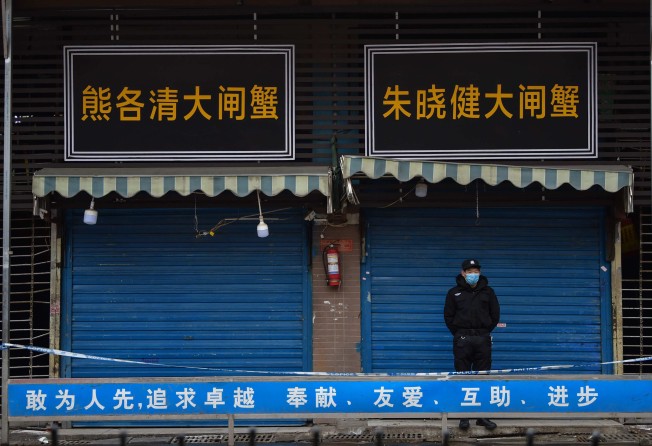
05:08
Nature or lab leak? Why tracing the origin of Covid-19 matters

A Chinese health expert has hit back at a Canadian researcher’s claims of strong evidence that Covid-19 originated from a wholesale food market in central China, saying the suggestions do not stand up to scrutiny.
Liang Wannian, the head of a Chinese government expert panel, said on Saturday that it was unscientific to conclude that some early cases of people living close to the market was proof that it was the origin of the community transmission.
“We think that Huanan Seafood Wholesale Market may not be the origin of Covid-19. This is a result … fully recognised by the WHO expert team after analysing the epidemiological records of patients,” said Liang, who was part of the WHO-China joint investigation team on Covid-19’s origins.
A team of 34 experts from China and 10 other countries conducted an on-the-ground investigation into the origins of Covid-19 in January and February.
The resulting report did not offer a conclusion. Instead, it listed four scenarios in which the virus could have been introduced to the human population, including from bats via an intermediary animal, a route that was considered the most likely.
In a paper published in the peer-reviewed journal Science in November, evolutionary biologist Michael Worobey, from the University of Arizona, said he examined early cases flagged by hospitals and reported in medical journals, as well as in media reports.
He said the research indicated that early links to the Huanan Seafood Wholesale Market in Wuhan were not just the result of reporting bias.
Worobey wrote in the paper that the first identified Covid-19 case mentioned in the WHO report had symptom onset on December 8.
A patient surnamed Chen – who was interviewed by Shanghai-based news outlet The Paper in March last year as the first known case not linked to the market – visited hospital on December 8.
But Worobey said a medical record shown in the video report indicated Chen’s visit was for a dental issue, not for Covid-19, and Chen said he did not experience symptoms until December 16.
This would make a woman surnamed Wei, also interviewed by The Paper, the earliest known case as her symptom onset was on December 11. She was a seafood vendor at the market and lived within 500 metres (1,640 feet) of the site, the Science paper said.
Liang said Worobey did not verify the identity of a patient featured in The Paper’s video report.
He said the first identified Covid-19 case did visit the hospital between December 6-8, and was accompanying a family member for a tooth extraction. However, he also started experiencing cold-like symptoms such as headaches and dizziness on December 8, according to Liang.
“The female vendor from Huanan Seafood Wholesale Market who had symptom onset on December 11, mentioned in the Science article, was not the first known Covid-19 case,” Liang said.
He added that China firmly opposed politicising the Covid-19 origins investigation, and searching for or fabricating evidence to support assumptions. Chinese and international scientists should conduct analysis based on facts and objectivity, he said.